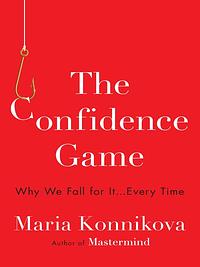You need to sign in or sign up before continuing.
Take a photo of a barcode or cover
informative
fast-paced
informative
medium-paced
Thorough analysis of how con men prey on basic human psychology. I am now questioning everything and everyone around me, but I still think it's good to know & be aware of why we do what we do so we can avoid basic tricks.
challenging
informative
medium-paced
adventurous
informative
medium-paced
funny
informative
reflective
medium-paced
In the last few years, I've gotten a bit addicted to documentaries about con artists. Whether it's Anna Delvey, Elisabeth Holmes, Fyre Fest, etc., I'm in. And in so many of these, I noticed the same person being asked to provide some insight to what happened - and it's Maria Konnikova. She's published several books, including this one, about confidence artists (con men) and why what they do works so well.
That's certainly on display here, and she cites quite a lot of research in support of this. The book truly shines when she's telling more stories about famous cons that happened through history - and she smartly often doesn't finish those stories right away, keeping the reader waiting to get to the resolution, etc. The problem is ... that's what really interested me. So reading about another study at Stanford or somewhere else was helpful, but I really wanted to get back to the family who just invested all their money in search of Sir Francis Drake's treasure, and so forth.
That said, it's fascinating to understand a bit more WHY folks are so gullible and easily led astray (there's a large percentage of one of our political parties that would be looking in the mirror if they read this book, though I'm not sure how much they read anything but wacked out conspiracy theories), and to realize that if you think "Well, that's just what happens to other people," then you're just as likely to get scammed as anyone else.
Definitely recommended, but keep expectations in check.
That's certainly on display here, and she cites quite a lot of research in support of this. The book truly shines when she's telling more stories about famous cons that happened through history - and she smartly often doesn't finish those stories right away, keeping the reader waiting to get to the resolution, etc. The problem is ... that's what really interested me. So reading about another study at Stanford or somewhere else was helpful, but I really wanted to get back to the family who just invested all their money in search of Sir Francis Drake's treasure, and so forth.
That said, it's fascinating to understand a bit more WHY folks are so gullible and easily led astray (there's a large percentage of one of our political parties that would be looking in the mirror if they read this book, though I'm not sure how much they read anything but wacked out conspiracy theories), and to realize that if you think "Well, that's just what happens to other people," then you're just as likely to get scammed as anyone else.
Definitely recommended, but keep expectations in check.
dark
emotional
informative
medium-paced
Hooter: An academic look at what traits are common to people who con.
If you ever watched the British TV series "Hustle" and wanted an academic look at that premise, you may like this book. I personally found it too academic for my interest as it reiterated the fact that "yes! we fall for the people who seem the most trustworthy and confident."
Maria deepdives into each scenario / process of conning as it involves building trust and then manipulating you in believing that you are doing everything of your accord and never once does the conner force you to take a decision but leaves you hanging and self doubting till you give in. She breaks it down chapter by chapter but gets confusing after a while with the examples being called back and not too much background on each. As a layman reader, this becomes a challenge to stay connected and hence felt very academic for me as a psychology treatise.
If you ever watched the British TV series "Hustle" and wanted an academic look at that premise, you may like this book. I personally found it too academic for my interest as it reiterated the fact that "yes! we fall for the people who seem the most trustworthy and confident."
Maria deepdives into each scenario / process of conning as it involves building trust and then manipulating you in believing that you are doing everything of your accord and never once does the conner force you to take a decision but leaves you hanging and self doubting till you give in. She breaks it down chapter by chapter but gets confusing after a while with the examples being called back and not too much background on each. As a layman reader, this becomes a challenge to stay connected and hence felt very academic for me as a psychology treatise.
I'm sure it's a good book, but I listened to the audio version and the narrator was SO boring, I couldn't keep going and had to return the book :(.


